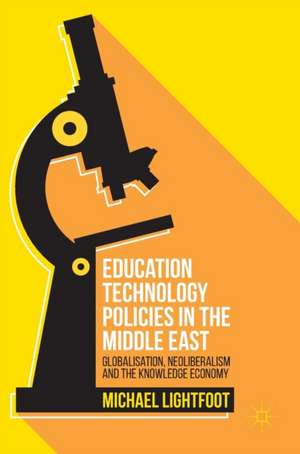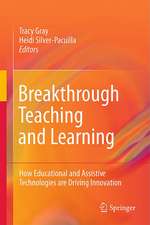Education Technology Policies in the Middle East: Globalisation, Neoliberalism and the Knowledge Economy
Autor Michael Lightfooten Limba Engleză Hardback – 28 sep 2016
iv>
| Toate formatele și edițiile | Preț | Express |
|---|---|---|
| Paperback (1) | 381.43 lei 6-8 săpt. | |
| Springer International Publishing – 30 apr 2018 | 381.43 lei 6-8 săpt. | |
| Hardback (1) | 386.61 lei 6-8 săpt. | |
| Springer International Publishing – 28 sep 2016 | 386.61 lei 6-8 săpt. |
Preț: 386.61 lei
Nou
Puncte Express: 580
Preț estimativ în valută:
73.98€ • 77.45$ • 61.21£
73.98€ • 77.45$ • 61.21£
Carte tipărită la comandă
Livrare economică 05-19 aprilie
Preluare comenzi: 021 569.72.76
Specificații
ISBN-13: 9783319332659
ISBN-10: 3319332651
Pagini: 193
Ilustrații: XIX, 191 p. 4 illus.
Dimensiuni: 148 x 210 x 19 mm
Greutate: 0.38 kg
Ediția:1st ed. 2016
Editura: Springer International Publishing
Colecția Palgrave Macmillan
Locul publicării:Cham, Switzerland
ISBN-10: 3319332651
Pagini: 193
Ilustrații: XIX, 191 p. 4 illus.
Dimensiuni: 148 x 210 x 19 mm
Greutate: 0.38 kg
Ediția:1st ed. 2016
Editura: Springer International Publishing
Colecția Palgrave Macmillan
Locul publicării:Cham, Switzerland
Cuprins
Introduction.- Chapter 1. Cultural and Educational Traditions in the MENA Region.- Chapter 2. Education in a Globalised Knowledge Economy.- Chapter 3. Educational Challenges in the Arab World.- Chapter 4. Structure and Agency in the MENA Region - Theoretical Perspectives.- Chapter 5.- Modernism Confronts Tradition.- Chapter 6. Reflections on the End of History.- Chapter 7. Bridging the Long Divergence.
Notă biografică
Michael Lightfoot is an education consultant with extensive international experience on development projects the Middle East and Afghanistan and in several former Soviet states. He has over thirty years of experience, both in the commercial IT sector and in academia, which have provided him with an unique insight into the ideologies and motivations underpinning education reforms involving technology.
Textul de pe ultima copertă
This book explores the potential educational technologies have for transforming education in the Middle East. Although technology has increasingly become a part of classrooms around the globe over recent decades, its application in classrooms in the MENA region remains underused and this book draws on a case study from the Arabian Gulf to examine the beneficial impact technologies have on teaching and learning. The book identifies the many social and cultural pressures that prevent government technology policies to be implemented in the way that the international community would find recognisable and acceptable and how education policy from the Global North is transplanted into a separate context without considering the different requirements. The study seeks to address the ways in which educational technology policy in government schools plays a part in the enactment of education reforms and how government policy aspirations are played out in practice.
Michael Lightfoot is an education consultant with extensive international experience on development projects the Middle East and Afghanistan and in several former Soviet states. He has over thirty years of experience, both in the commercial IT sector and in academia, which have provided him with an unique insight into the ideologies and motivations underpinning education reforms involving technology.
Caracteristici
Explores how technology has the potential to transform education, teaching and learning in the Middle East Highlights learning, creativity and openness as aspects of the Knowledge Economy Examines why education policies fail when directly transplanted to the Middle East without adaption



